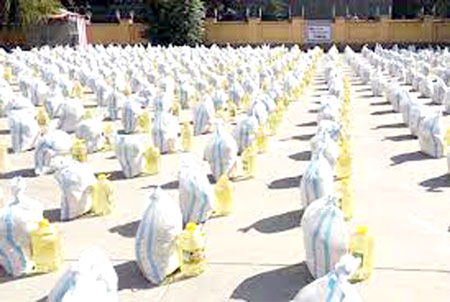The US Special Inspector General for Afghanistan Reconstruction (SIGAR), released a report indicating that on-budget US reconstruction assistance to Afghanistan completely ceased with the fall of the previous government, but that Afghanistan continues to receive some reconstruction funds from the US through off-budget assistance and multilateral organizations.
“Although on-budget assistance ceased on August 15, 2021, SIGAR found that US agencies continued reconstruction assistance through 100 off-budget activities and activities implemented by multilateral institutions. Specifically, US agency off-budget assistance funded 85 activities, while assistance to multilateral institutions funded the remaining 15 activities. These ongoing efforts covered a range of activities, including emergency food assistance, health initiatives, and demining efforts,” the report said.
According to SIGAR’s report, of the six US agencies that funded Afghan reconstruction in the 2021 fiscal year, four were operating in Afghanistan until October 1, 2021, when Washington’s development aid to Kabul completely halted with the fall of the republic.
“SIGAR found that six US agencies—State, DOD, USAID, USAGM, DEA, and DFC—funded reconstruction activities in Afghanistan in FY 2021. Of these, only four (State, USAID, USAGM, and DFC) had ongoing reconstruction activities as of October 1, 2021,” the report reads.
Based on SIGAR’s report, the 100 activities (off-budget and with multilateral organizations) have pledged more than $670 million to Afghanistan and have provided $ 470 million worth of food and health assistance to Afghanistan.
“As of October 1, 2021, the 100 activities had $676 million in obligations, $470 million in disbursements, and $64 million in unliquidated funds. State acknowledged that programming may benefit the Taliban,” the report reads.
“U.S. agencies stopped providing on-budget assistance to the Afghan government on August 15, 2021, after the Afghan government collapsed and the Taliban returned to power. During FY 2021, U.S. on-budget assistance consisted of two USAID-funded activities and DOD’s support to the Afghan National Defense and Security Forces (ANDSF),” the report further mentioned.
Economists said that the rate of poverty and unemployment in the country has increased with the end of US development aid.
“If commercial goods are bought from abroad, imported and distributed, it will harm the country’s economy,” said Shakib Mir, an economist.
“The assistance will benefit the country in the short term, but it will not benefit the country in the long run,” said Abdul Nasir Rashtia, another economist.
However, a financial and banking expert said that humanitarian aid is not beneficial for the growth of the country’s economy.
“Aid has not been able to bring about changes in poverty reduction or provide jobs, but, on the contrary, poverty has increased and unemployment has risen,” said Seyar Qarishi, an expert on finances and banking.
Although the US direct aid to Afghanistan has been suspended, the US Special Inspector General has said that Washington may resume its support for Afghanistan.
Meanwhile, Kabul welcomed international aid in the country.
“The Islamic Emirate asks the humanitarian organizations to play their role in helping the people of Afghanistan in all sectors, in the economy, health, development–all sectors–and to cooperate with us based on a humanitarian point of view,” said Bilal Karimi, deputy spokesman of the Islamic Emirate.
The Islamic Emirate said it hopes that foreign countries will help in solving the humanitarian crisis in Afghanistan.
With the fall of the previous government and the cessation of international aid to Afghanistan, the level of poverty and hunger increased to such an extent that a large number of citizens sold their young children and kidneys to pay for food.









